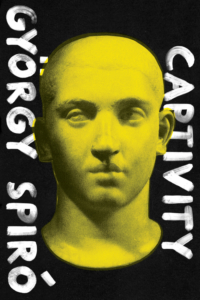Tr. by Tim Wilkinson
If creating great historical fiction requires more than an intellectual curiosity about the past but also an appreciation for the nuanced way that history’s shadows accrete to color our present, then Hungarian author György Spiró’s Captivity stands with the best of the genre. Over the course of eight hundred meticulously researched pages Spiró tells the life story of Uri, a devout Jew born and raised in Rome amidst the Roman Empire’s excesses and carnage.
The novel opens in 33 A.D. when Uri is in his early twenties, still living off his parents’ very modest means. Due to his partial blindness — a disability rich with meaning for the way that he “sees” the world — Uri is unfit for work and instead spends his days and nights reading, scrolls clutched close to his face, sating his desire for knowledge about the world. Uri’s quiet existence is upended when, unexpectedly, he is selected to join the Roman delegation making the annual Passover pilgrimage to Jerusalem. His journey to Jerusalem is the start of many months away from home, living first in Judaea, then Alexandria.
Uri is eyewitness to Christianity’s infancy and rapid spread in the Roman Empire. He briefly meets Jesus of Nazareth during a night that they spend together in the same prison cell. Spiró’s Jesus is not the attractive, thoughtfully benevolent young man of church paintings but rather a “fat man,” older, balding with an unkempt, graying beard, soft spoken but with a voice that “seemed loud.” When the guards remove Jesus from the cell early the next morning Uri knows nothing of Jesus’ reputation or his impending crucifixion. Only decades later when Uri’s son, Marcellus, converts to the nascent Christian faith does Uri make the connection between Marcellus’ Messiah and the man who he met in prison.
Captivity is most compelling when Uri’s sharp, rational mind focuses on questions of personal faith. He does this from time to time with his own Jewish beliefs but never with the same astringency that he applies to Marcellus’ conversion to Christianity. Uri rejects the notion that the man with whom he shared a prison cell is the same Messiah for whom Jews have been waiting for centuries. Undoubtedly no small part of Uri’s skepticism stems from the unremarkable impression that the “fat man” made upon him many years ago. He becomes convinced that Christianity’s rapid proliferation is not organic but rather a calculated accommodation between Jews and Greeks, a means to end their continuous struggle for commercial supremacy and to frustrate Rome’s tactic of pitting Jews and Greeks against each other, to the Romans’ advantage. Uri believes that the story of Jesus’ resurrection was invented as the perfect catalyst to unite and mobilize Jewish and Greek proselytes who then unwittingly, would promote these political and economic objectives. Uri’s theory finds fertile ground in our own “enlightened” times, with interested parties exploiting religious devotion to advance political ends.
The vast amount of historical information and rich, contextual detail found within the pages of Captivity are a testament to Spiró’s laborious research. In this respect the novel could be read as a prologue to Gibbon’s The Decline and Fall of the Roman Empire. Like Gibbon, Spiró impresses upon us the ethnic, religious and social diversity of the Empire — Ethiopians, Syrians, Greeks, Egyptians, Italians; Jews, pagans, Christians; rulers, scholars, tradesmen, and slaves — and puts the era’s gross callousness toward suffering and death in sharp focus with descriptions of mass executions, infants and mothers among the victims; deadly, public entertainment spectacles; and internecine power struggles — a profligate and indiscriminate pattern of killing that is difficult to comprehend, even in our violent times.
But as much as it excels on the grand scale, Captivity is less successful at the human level. Despite the many hundreds of pages that we spend with Uri, somehow his character feels hollow. We are kept outside the current of his thoughts and feelings, denied the satisfaction of developing a connection with him. (Spiró’s use of the third person to narrate Uri’s story no doubt contributes to this emotional distance.) As a consequence many of Uri’s impressions and reactions feel misplaced, like his virulent misogyny: we don’t understand its source or what sustains it. And while we come to suppose that Uri’s inability to form intimate relationships must be connected to a belief that he failed both his father and his eldest son — the two people he loves most — we are unable to appreciate the emotional landscape that sustains his pain and influences his actions.
Spiró’s choice of title is revelatory. Captivity is confinement, not only physical but also intellectual and emotional; it limits what we experience, restricting our capacity to change. Throughout the novel Uri remains captive to his personal history, just as humanity is captive to its collective history — an endless cycle of prejudice, violence, injustice, and corruption that permeates our present day beliefs and actions. And what is worse, we, like the subjects of ancient Rome, tolerate and remain complacent to these ills, a legacy of capitulation to the comfort of being blind to what we prefer not to see.
Lori Feathers is a freelance book critic. Her recent reviews can be found at Words Without Borders,World Literature Today, Three Percent, Rain Taxi and on Twitter @LoriFeathers
This post may contain affiliate links.








